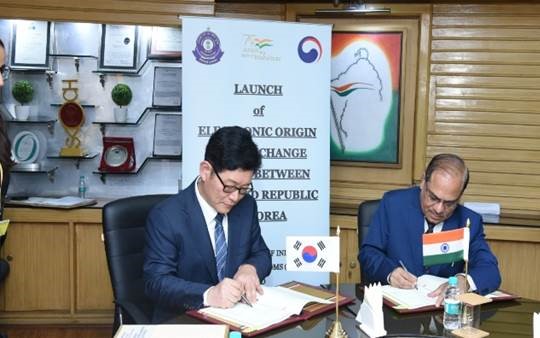
India-Korea Electronic Origin Data Exchange System (EODES)

09.12.2023
India-Korea Electronic Origin Data Exchange System (EODES) , Daily Current Affairs , RACE IAS : Best IAS Coaching in Lucknow
|
For Prelims: About India-Korea Electronic Origin Data Exchange System (EODES), About Comprehensive Economic Partnership Agreement For Mains paper:What are the types of Trade Agreements?,India-South Korea Trade and Economic relations |
Why in the news?
Recently,Mr. Sanjay Kumar Agarwal, Chairman, Central Board of Indirect Taxes & Customs (CBIC), launched the India-Korea Electronic Origin Data Exchange System (EODES), in the presence of Commissioner of Korea Customs Service (KCS) in New Delhi.
About India-Korea Electronic Origin Data Exchange System (EODES)
- EODES will facilitate implementation of India-Korea Comprehensive Economic Partnership Agreement (CEPA) by electronic exchange of origin information between the two customs administrations for goods traded under the CEPA.
- The Electronic Origin Data Exchange System is aimed at facilitating the smooth implementation of the India-Korea Comprehensive Economic Partnership Agreement (CEPA) by way of electronic exchange of origin information between the two customs administrations in respect of the goods traded under the CEPA.
- The data fields in a Certificate of Origin (CoO) shall be electronically shared by the exporting customs administration with the importing customs, as soon as the certificate is issued.
- This would facilitate faster clearance of imported goods.
About Comprehensive Economic Partnership Agreement (CEPA):
- It is a type of free trade pact that covers negotiation on the trade in services and investment, and other areas of economic partnership.
- CEPA also looks into the regulatory aspect of trade and encompasses an agreement covering the regulatory issues.
What are the types of Trade Agreements?
Free Trade Agreement: It is an agreement in which two or more countries agree to provide preferential trade terms, tariff concession etc. to the partner country. Here a negative list of products and services is maintained on which the terms of FTA are not applicable.
Preferential Trade Agreement: In this, two or more partners give preferential right of entry to certain products. This is done by reducing duties on an agreed number of tariff lines. India signed a PTA with Afghanistan.
Comprehensive Economic Partnership Agreement: It is more comprehensive than an FTA. CECA/CEPA also looks into the regulatory aspect of trade.
Comprehensive Economic Cooperation Agreement: CECA generally covers negotiation on trade tariffs and TQR rates only. It is not as comprehensive as CEPA. India has signed CECA with Malaysia.
Framework agreement: It primarily defines the scope and provisions of the orientation of the potential agreement between the trading partners. It provides for some new areas of discussion and sets the period for future liberalisation. India has previously signed framework agreements with the ASEAN, Japan etc.
India-South Korea Trade and Economic relations
- In 2022, trade between the two nations reached an all-time high at USD 27.8 bn. The target is to reach USD 50 bn by 2030.
- In 2018, Indian Prime Minister Narendra Modi and South Korean President Moon Jae-in jointly opened Samsung Electronics’ Noida smartphone assembly plant, the largest facility of its kind in the world.
- Trade and economic relations have gathered momentum again following the implementation of CEPA in 2010 and bilateral trade in 2011 registered a 70% growth over two years.
- Major items of India’s exports to Korea are mineral fuels/oil distillates (mainly naphtha), cereals, iron, and steel.
- Korea’s main export items are automobile parts, telecommunication equipment, hot rolled iron products, petroleum refined products, base lubricating oils, nuclear reactors, mechanical appliances, electrical machinery & parts, and iron and steel products.
- India and South Korea launched an initiative ‘Korea Plus’ in 2016 to promote and facilitate Korean Investments in India.
- Major Korean conglomerates such as Samsung, Hyundai Motors, and LG have made significant investments in India.
In 2022, India-South Korea held its fifth Foreign Policy and Security Dialogue in Seoul.